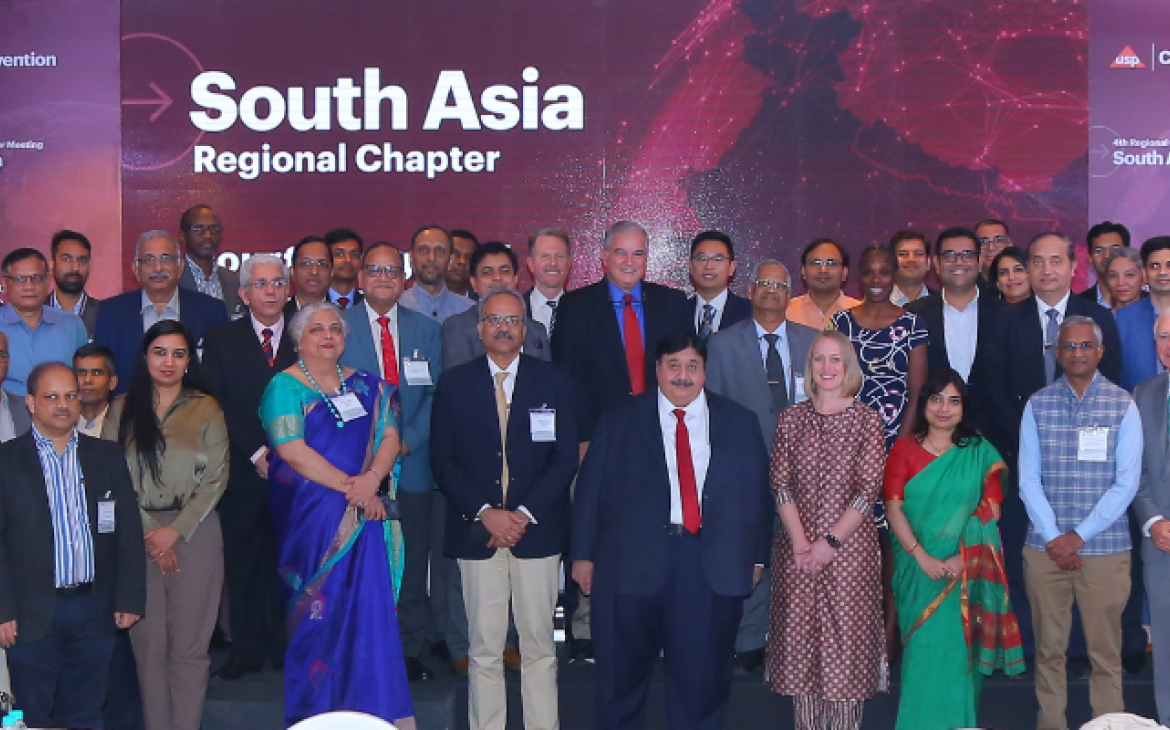
Many groups have interest in USP’s activities, and are impacted by the work undertaken by our volunteers and staff. The pharmaceuticals and biopharmaceuticals industries, governmental agencies, healthcare practitioners, members of academia, among others, maintain special relationships with USP.
Internally, these groups are collectively known as Stakeholders. Through collaboration, partnerships, and robust engagement, USP-Stakeholder relationships are key to our mission to improve global public health. Today, we focus on a Stakeholder group with whom USP staff regularly interacts: pharma compliance managers.
There’s a chance you may work in pharma and not know about USP, but rest assured your compliance manager does.
 What, exactly, does your compliance manager do? How does he or she interact with USP? To find out, we asked award-winning source Charles “Chuck” Bates from Sandoz—recent recipient of the Novartis Group Advanced Sciences & Technologies-Quality Control Award for Individual Commitment to Excellence. Mr. Bates serves as Compliance Manager at Sandoz, and acts as their global single-point-of-contact on compendial compliance. Sandoz has been in the news recently for receiving the first-ever-issued FDA approval for a biosimilar drug.
What, exactly, does your compliance manager do? How does he or she interact with USP? To find out, we asked award-winning source Charles “Chuck” Bates from Sandoz—recent recipient of the Novartis Group Advanced Sciences & Technologies-Quality Control Award for Individual Commitment to Excellence. Mr. Bates serves as Compliance Manager at Sandoz, and acts as their global single-point-of-contact on compendial compliance. Sandoz has been in the news recently for receiving the first-ever-issued FDA approval for a biosimilar drug.
How many cumulative years do you have in pharmaceuticals industry compliance?
Over twenty years. I started out in the pharma industry straight out of university, but then took a turn for thirteen years doing geochemistry and came back to pharmaceuticals twenty-two years ago. Having a variety of experience from geo to pharma, bench chemistry to instrumental, investigative to managerial, gives me a great perspective of compliance.
What is your relationship with USP?
I am an observer member to the Council of the Convention as the Chair of the Midwest Compendial Discussion Group. I chaired the Fall 2014 Prescription/Nonprescription Stakeholder Forum as well as being on the planning committee for several years. I am also a member of the USP’s Compendial Process Improvement Project Team. I have close ties with many of USP’s excellent associates, built through my years of work with the USP.
Compliance is a broad term that means different things to different industries. How do you define compliance?
In general terms it means knowing what the rules are and following them. It also means knowing the process to change those rules when it is determined that there are improvements that can be made, or newly discovered safety issues that must be implemented. It is the understanding that you cannot break the rules, but must comply with the process as well to change them.
Your award affirms your commitment to high-quality work and continuous improvement. Focusing on the continuous improvement aspect, how critical is a compliance manager’s constant evaluation of processes and procedures to a company’s success?
It is very critical. The world is changing at an exponential rate in technology and knowledge so one must always be aware of the changes that are occurring, or be left behind. An understanding of what the changes are is also critical--as change for change’s sake is not always prudent; one must understand what that impact is and follow their process to determine the value.
From which aspect of your job do you derive the most satisfaction?
I derive satisfaction when I see that there is an understanding, i.e. the light goes on. It is also satisfying when the process runs smoothly--such as when a proposal comes out it is reviewed and understood so that when the implementation is published it is a smooth transition from the old to the new.
Regulatory compliance is a well-known concept, but compendial compliance may be a new phrase to some of our readers. May you provide us with an overview of what compendial compliance means, and how you work to achieve it?
To me, regulatory compliance is the culmination of the process of getting a drug to market and the compendial compliance is the base on which it is built. The USP, as well as the other compendia around the globe, build the basis of safety and efficacy of the drugs and materials that we consume. Pharmaceutical manufacturers can always, and should, when capable, go above and beyond the requirements of the compendia, but the compendia sets the starting bar. Without this basis as a foundation there can be no culmination in a regulatory approval.
How would you characterize the USP – Stakeholder relationship, and how important is this relationship to the development of trusted public standards?
This is a very important relationship, as the USP, industry, FDA form the triumvirate of pharmacopeial safety. The USP needs industry for the knowledge and methodologies it provides to populate the USP. The FDA is there to enforce the USP and give approval to the methods that show the safety and efficacy of the pharmaceuticals that industry provides. Industry needs USP’s guidance in what the level of quality has to be for the medicines produced here in the US and several other regions around the world that use the USP as its codex. One cannot be successful without the other’s support.
How has technology improved your ability to collaborate and share, and how have technological advancements improved industry compliance practices?
The world is shrinking in our interconnectivity while the knowledge that we all share is growing. It is now very easy and fast to communicate issues as they are found. Once it use to take weeks to share a problem that now takes hours. The solutions to those problems can also be as quick, due to the capability of global collaboration to solve the problem in real time. The sharing of general problems within industry only pushes all of us to greater compliance--as we all want to be the best. It is not only for altruistic reasons but for business as well. People want and deserve the best and safest medicines that they can obtain.
You work with USP’s Donor Recognition Program. People in industry may not know that USP relies not only on volunteer expertise, but on volunteered proposed monographs and bulk materials. For your contemporaries reading this who may be interested in participating, what are the benefits of participating in the USP Donor Program?
You become a leader in the standards that the world works with. We all take pride in our work, and to see it published--the methods and monographs--for the greater good of the patient makes it worthwhile. The donation of material for reference standards is also important as it ensures that the methods are producing accurate results.
Learn how you can become an expert volunteer and get involved in USP’s standard setting activities.


